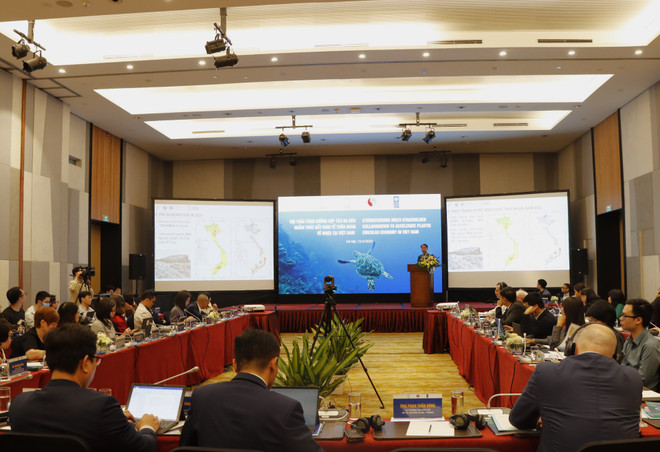 At the seminar on circular economy for plastics in Hanoi on April 12. (Photo: baotainguyenmoitruong.vn)
At the seminar on circular economy for plastics in Hanoi on April 12. (Photo: baotainguyenmoitruong.vn)The seminar formed part of activities within theannual conference of the working group implementing the Vietnam NationalPlastic Action Partnership, which took place the same day.
In his opening remarks, Le Ngoc Tuan, head of the InternationalCooperation Department under the Ministry of Natural Resources and Environment,stressed that the circular economy has been seen as a solution to plasticpollution.
He also stressed the need to adopt a comprehensiveapproach, both nationally and globally, to spur the circular economy forplastics, citing cooperation mechanisms between countries and incentives inplastic pollution settlement.
Countries should upgrade their technologicalinfrastructure to encourage businesses and the private sector to embark onlong-term investment, the official continued.
The working group reported that the accumulative volumeof plastics that is not properly managed in Vietnam is expected to pile up to3.15 million tonnes in 2030 from 1.53 million tonnes in 2018 according to a normalscenario. This will lead to a significant increase in plastic waste leakage.
If the current pace of waste collection andtreatment is maintained, the estimated amount of plastic discharged into theenvironment each year will rise from about 182,000 tonnes in 2018 to 373,000tonnes in 2030.
The participants looked into the current situationof plastic waste in Vietnam, and identified key actions that need to be taken. These include raising consumer awareness of sustainable packaging, promoting theimplementation of Extended Producer Responsibility (EPR), green financing forrecycling projects, and raising localities’ capacity in plastic and solid wastemanagement./.





























